WASHINGTON, D.C. -- The Russia-Georgia war in South Ossetia a year ago may have been a tipping point in recent Georgian and Russian relations, at least from the Georgian public's perspective. A Gallup Poll conducted in Georgia in May finds the percentage of Georgians who say their country has to have good relations with Russia by all means falling below a majority for the first time since Gallup began polling there.
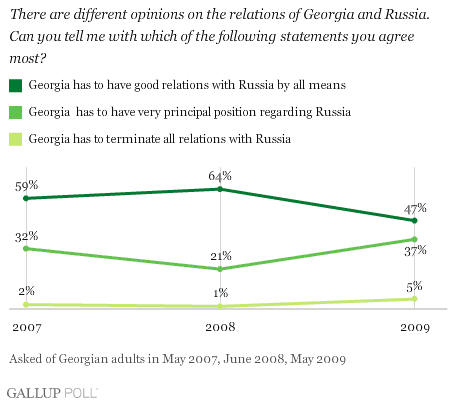
Gallup's survey of Georgia finds the percentage of Georgians saying their country has to have good relations with Russia by all means down 17 percentage points to 47% in May 2009 from a pre-war 64% in June 2008. Several Gallup Polls conducted before the five-day war in August 2008, showed roughly 6 in 10 or more Georgians saying this. In tandem with this decrease, there has been an increase in the percentage of Georgians who now say their country needs to have a very principal position regarding Russia -- to 37% from 21%. Another 5% say Georgia needs to terminate all relations with Russia -- up from 1%.
Regardless of these shifts, Georgians are still more likely to favor good relations with Russia at all costs than favor terminating or having Georgia take a principal position regarding Russia. This likely reflects the strength of Georgians' close cultural, historical, and economic ties to Russia.
These ties, as well as the tensions evident in the nationwide survey, surfaced in focus groups Gallup conducted in Georgia in February. "I have many friends in Russia," one Georgian participant said when asked about relations since the conflict. "We preserve our good relationships, but as soon as we start talking about politics, the relationships become strained."
Relatively few citizens in Russia -- a country in a position of power with arguably less to lose economically than Georgia -- place the same importance on good relations that Georgians do. In contrast with their Georgian neighbors, 15% of Russians interviewed in June 2009 say their country has to have good relations with Georgia by all means. A majority of Russians (55%) say Russia has to have a very principal position regarding Georgia, while 10% say Russia has to terminate all relations.
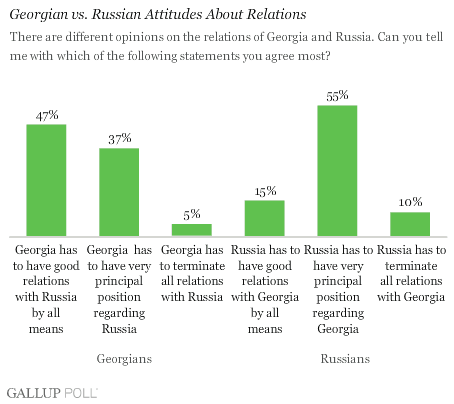
Relations in the Region
As they did before the war, Georgians are still most likely to name Russia as the country that Georgia should have the closest relationship with in the Commonwealth of Independent States region. However, this desire is not what it was. The 32% of Georgians who now say their country should have the closest relationship with Russia represents a decline of 25 points from 57% in June 2008. More Georgians choose Ukraine (13% in 2008 vs. 22% in 2009) and Azerbaijan (5% in 2008 vs. 12% in 2009) than they did before the war.
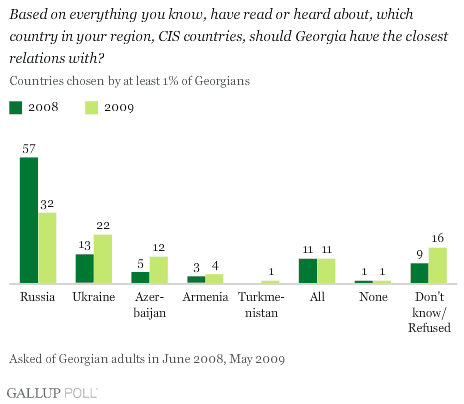
Relations With the United States and the European Union
As some Georgians lost admiration for Russia after the conflict, relations with the European Union and United States gained in perceived importance. Overall, Georgians' attitudes toward relations with all three players are more mixed than they were before the war. The percentages of Georgians who say it is more important for their country to have a close relationship with either the EU or U.S., even if it might hurt the relationship with Russia, have doubled since the war.
The percentage of Georgians who say it is more important for their country to have a close relationship with the U.S., even if it might hurt their relationship with Russia, is up to 24% in the most recent survey from 11% before the war. Similar percentages of Georgians say it is important for Georgia to have close relations with the U.S. (24%) even if it hurts Russia and with Russia (28%) even if it hurts the U.S.
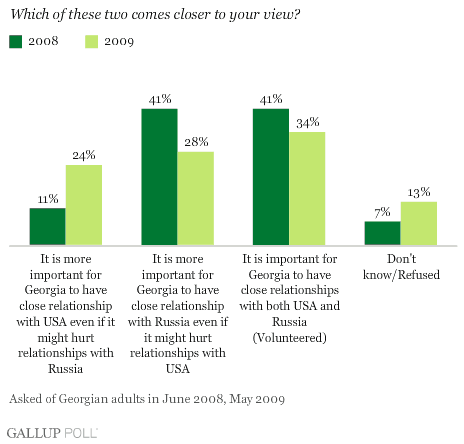
In a change from their pre-war attitudes, Georgians are now slightly more likely to say that it is important for their country to have close relations with the EU (27%) than to say the same about relations with Russia (22%).
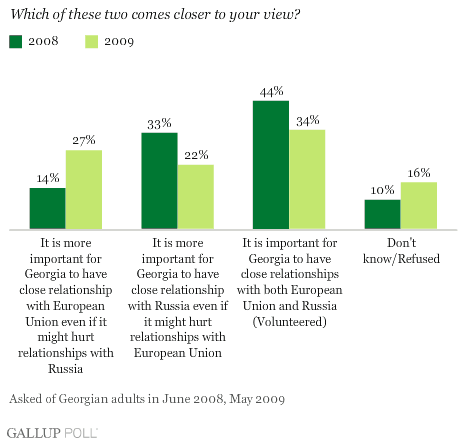
About a third of Georgians (34%) volunteer that it is important for Georgia to have close relationships with all three.
Friends Again?
Neither Russians nor Georgians have given up hope that the two nations will someday be able to reconcile -- and give similar estimates as to when they think this will happen. Roughly 4 in 10 Russians (40%) and Georgians (43%) think it will happen in less than 10 years. About 1 in 10 Georgians (10%) and Russians (8%) think the two will never become friendly states again. High percentages in both countries, however, say they don't know.
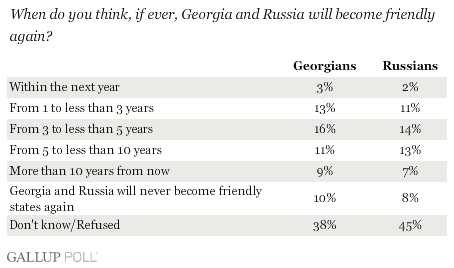
When asked what the future holds for relations between the two countries, a Georgian focus group participant expected history would repeat itself. "First, they [relations] will improve and then worsen again. It is always like that," the participant said. "This is the history of Russian-Georgian relationships for centuries."
For complete data sets or custom research from the more than 150 countries Gallup continually surveys, please contact worldpollpartners@gallup.com or call 202.715.3030.
Survey Methods
Results are based on face-to-face interviews with approximately 1,000 adults, aged 15 and older, conducted in May 2007, June 2008, and May 2009 in Georgia. South Ossetia and Abkhazia were not included for the safety of the interviewers. The excluded area represents approximately 7% of the population. For results based on the 2007, 2008, and 2009 samples, one can say with 95% confidence that the maximum margin of sampling error is ±3.5 percentage points. Results in Russia are based on face-to-face interviews with approximately 2,000 adults, aged 15 and older, conducted in June 2009. For results based on the 2009 sample, one can say with 95% confidence that the maximum margin of sampling error is ±3 percentage points. The margin of error reflects the influence of data weighting. In addition to sampling error, question wording and practical difficulties in conducting surveys can introduce error or bias into the findings of public opinion polls.
Focus groups were conducted in Tbilisi in mid-February 2009.
